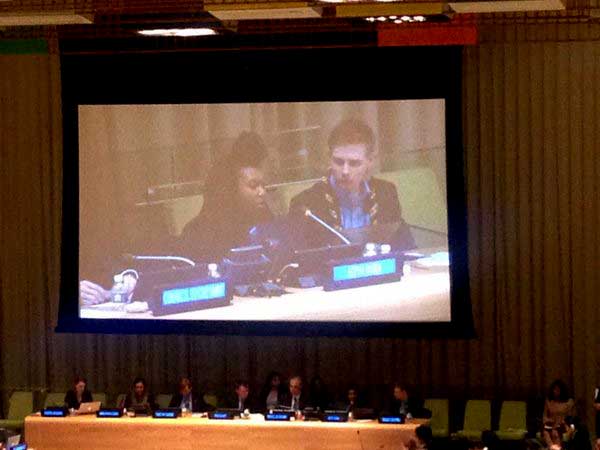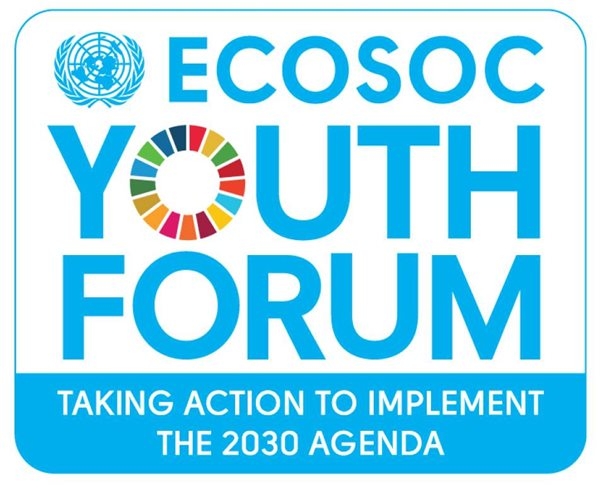Recapping the ECOSOC 2016 Youth Forum

While there is a general consensus as to the importance of the Sustainable Development Goals (SDGs), there is much debate surrounding their implementation, largely due to their expansive scope. Lofty indeed, the SDGs seek idealistic aims such as the elimination of hunger and poverty and the preservation of the Earth’s environment.
The United Nations Economic and Social Council (ECOSOC) 2015 Time for Global Action Youth Forum was held last week with the aim of involving the world’s youth in the implementation of the SDGs. Youth delegates representing national governments, NGOs, and universities convened at the United Nations Headquarters to discuss topics ranging from establishing partnerships to maintaining transparency. Issues such as poverty, gender inequality, and the environment often disproportionally affect the world’s youth, a reality made plain in many impassioned speeches at the event. Over the span of the two-day forum, one theme consistently emerged: the need for youth representation.
Ahmad Alhendawi, the UN Secretary-General’s Envoy on Youth, delivered an address focusing on misperceptions surrounding the world’s youth. He challenged participants to look at young people not only as the “future,” but as the present, as people who are directly affected by the issues the SDGs seek to address. Author Samar Mezghanni emphasized the potential for agency amongst the world’s youth. “It’s a lie that a child’s only mission in the world is to receive,” said Mezghanni, speaking on the unique power of youth to organize for good. “We care about the most vulnerable, because we are not distanced from them.”
The forum did not shy away from daunting issues. The link between high youth unemployment rates and extremist recruitment regularly emerged, and Jordanian MP Moh’d al Hajouj called directly on youth to be involved in the reduction of violence in the Middle East. Other presenters gave firsthand accounts touching on subjects such as the struggle of being a young refugee and the problems facing victims of child marriage.
After opening addresses, youth delegates attended breakout sessions tasked with the creation of recommendations to include in a final report to be utilized by the UN. Monday’s sessions focused on specific themes from the SDGs such as gender equality and creating peaceful societies, while Tuesday’s addressed issues related to geographical regions.
While the forum provided a platform for young people to identify the areas that mattered most to them, finding solutions proved more difficult. This issue became apparent during the final plenary session, where criticism emerged over a lack of measurable progress since the 2015 forum. Many of the recommendations proposed by participants were complicated by the lack of resources for youth projects and a general lack of trust for youth from governments and organizations.
Timothy Damon, US Youth Delegate to the UN Climate Talks, expressed frustration at the lack of ability to bring youth representatives from the global south to discuss climate change. Young people in the global south are the most vulnerable to the effects of climate change, yet many countries do not allocate funding to send youth representatives to major talks, Damon said. Additionally frustrating was the lack of support in obtaining visas for delegates who wished to travel to climate events.
Others remained optimistic, voicing hope that the delegates would fulfill one of the primary goals of the forum—to take their enthusiasm for the SDGs back to their home countries and organizations where they can act as catalysts for change.
Largely, the forum may have created and raised more questions than it answered, but in many ways, this seemed to be the point. If the forum proved anything, it was that youth are intrinsically linked to the issues the SDGs address, and eager to begin exploring solutions. The youth of ECOSOC 2016 clearly know the “why” of the SDGs, now it is up to them to discover the “how.”
—
Emily Fox is a Senior Editor for the Journal of Diplomacy and International Relations. She graduated from Western Kentucky University with a double major in Photojournalism and Religious Studies and is currently pursuing an M.A. in Diplomacy and International Relations at Seton Hall University, where she is specializing in Foreign Policy Analysis and International Security.
Follow Emily Fox on Twitter: @emilyefox
Follow the Journal on Twitter: @JournalofDiplo

